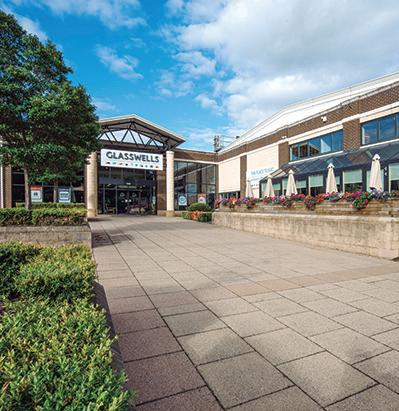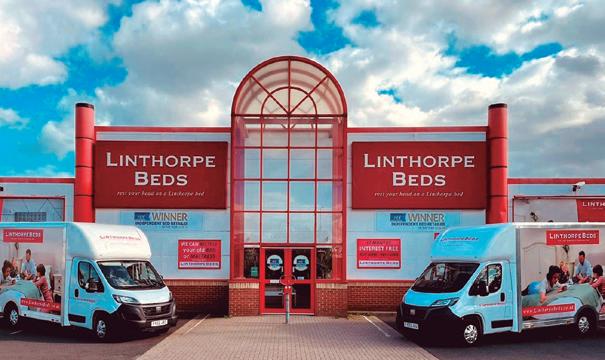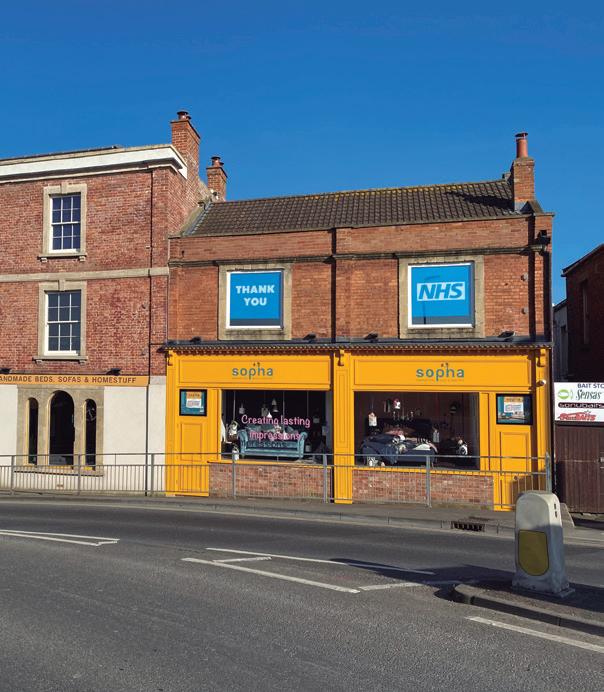
6 minute read
Green Retail
In the next part of our ongoing sustainable series, we take a look at a number of independent furniture retailers and what they are doing in terms of sustainability. Next up, Glasswells, Sopha, and Linthorpe Beds.
The topic of sustainability is not anything new but its importance is ever relevant and continues to grow. You may have seen a greater choice of sustainability-led products within the furniture industry over the past few years, from bottle-filled mattresses to fully recycled components at the core of new products. This is fantastic and long may it continue. Alongside product innovations, businesses are also adapting new ways of working to make their operations greener. In the next instalment of our series, we explore what some of the independent retailers are doing in this area as we focus on Glasswells, Sopha and Linthorpe Beds.

GLASSWELLS
Glasswells says that sustainability is on high on their agenda. From regular e-shots and blogs to informative eco-information on their website, the business promotes sustainable practices and their efforts openly. During the last year alone, Glasswells has continued to build on its sustainability commitment across a number of areas, including solar panels, electric vehicles, packaging and recycling to name but a few. On solar panels, in 2014 Glasswells began the process of installing a total of 580kW solar panels at its stores in Bury St Edmunds and in Ipswich, as well as at its warehouse. In December 2021 the company installed a 118kW system on the roof of its Haverhill branch, which has reduced energy draw down from the grid by over two thirds. In June 2022, Glasswells added a further 410kW solar panel system to the Bury St Edmunds store. “We are now in discussions to add a further 200kW system to our storage and distribution centre, in line with our environmental policy. We have changed our heating from gas to electric, which benefits from using the energy generated from the solar panels to heat and cool our buildings. This has minimised the environmental impacts of our business,” said Paul Glasswell, Managing Director of Glasswells.
The company has installed four electric vehicle charging points at its Bury store this year too, which are being used regularly by customers. Glasswells has even replaced some of its company cars with electric vehicles. On other initiatives, Paul added: “We have partnered with Clearabee for collection and disposal of our customers’ old furniture, while in our warehouse we are shredding the card board boxes that products are delivered to us in and using this, instead of bubble wrap, when repacking goods for customers. All our light bulbs have been changed to be LED energy efficient bulbs in all our stores and our general waste is sent to West Suffolk District Council, which is processed into renewable energy.
“We have reduced the number of carrier bags that we use, and the ones that we do use now are made of 100% recycled plastic and are 100% fully recyclable. We are also using paper bags in our gift departments. There is increasing awareness of the need to look after our planet, and we support suppliers who are committed to this. We promote the environmental benefits of purchasing our ranges from Harrison and Hypnos. In addition, we have started working with a new supplier, Millbrook Beds, as they offer a fully recyclable, zero to landfill range of beds called Smooth Tech.”
Paul Glasswell, MD at Glasswells

SOPHA
Sustainability plays an important role at Sopha with one of their founding aims to discover what it means to be a sustainable furniture retailer. Matt Scott, Co-founder, explains: “Our entire building has been stripped back to introduce energy saving features such as wall, floor and roof insulation and LED lighting, however we feel that there is still a huge amount more that we can do. Back when we started the business we were talking to our suppliers about sustainable materials and while many suppliers were already using FSC certified timbers the idea of using foam alternatives was far from most supplier’s list of priorities. The saying that every cloud has a silver lining I think is particularly apt to the rise in the cost of foam throughout the Covid pandemic that has forced many suppliers to look towards more sustainable alternatives for their upholstery and we’re delighted to be on the journey with them.”
Sopha is currently working on writing a sustainability report on each of their products that they’ll be able to share with customers. The business already hosts a sustainability page on its website too, further outlining their commitment. “We always feel like we’re learning but in everything we do we aim to become more sustainable; from LED lighting throughout our shop to mattresses with fewer damaging foams and plastics making them carbon negative. Our coffee shop is largely plasticfree too! In addition to that we’re constantly working with our suppliers to switch to more sustainable products and packaging to make sure we’re still able to make a difference into the future.”www.sopha.co.uk


LINTHORPE BEDS
Finally, sustainability is equally important to Linthorpe Beds. The business has implemented various initiatives and continues to look at ways to improve its carbon footprint. Recent examples in include recycling initiatives in the business, including offering customers the option of taking their old mattress away to be processed in a way that benefits the planet. “We recycle packaging in our warehouse daily (we’ve recently had a bailor installed) and work collectively with the bedding industry to keep up to date with new ideas on how to keep our company operating in a sustainable way,” the company said. In addition to this we are currently reviewing how our price tickets are displayed and working on solutions to reduce the amount of paper used throughout our stores. It’s getting the balance right between providing our customers with the information they need versus the amount of paper we use to do that. We are more efficient with planning and routing deliveries and all vans have a tracking system so we can measure and track our carbon footprint and improve on this daily. We also utilise direct home deliveries from manufacturers instead of delivering goods into us to also save on carbon footprint. We work with suppliers on delivering goods into us to also deliver with full vans or on a van that is also going to stores in locations nearby.

“We now distribute boxes of collected fabric from the draw straps and the mattress borders used to protect the mattress on delivery. We now supply these to local care homes/colleges and nurseries for crafts. This reduces our waste and in turn gives back to our local communities. One care home has now started a winter sewing club thanks to the material donated by us. We have also sent a few boxes over to a local community group based in the Thorntree area of Middlesbrough. They will be using the fabric offcuts to create blankets to issue to those who will be struggling to put the heating on this winter.”










